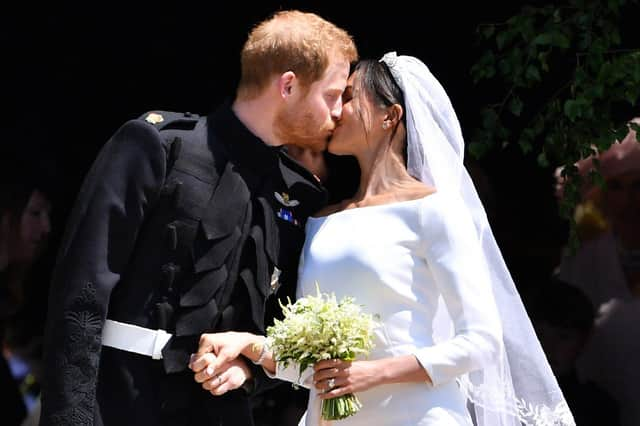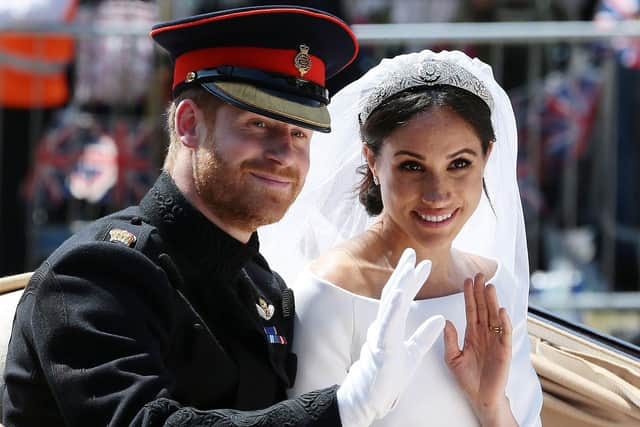Harry’s disloyalty is an abdication crisis for our times – David Behrens


But this week’s development in an unseemly saga of tantrums, hubris and ungraciousness marks a new low in an abdication story for our times.
It was on Monday that we learned of Harry’s threat to sue the Home Office over its refusal to lay on security for his infrequent visits to the UK, even if he paid for it himself. The decision made it “too dangerous”, he said, for him to come here at all.
Advertisement
Hide AdAdvertisement
Hide AdSo if neither side backs off, we will witness the first legal case in modern times brought by a Royal against Her Majesty’s government.


On a personal level, the standoff means that the Queen may never meet her great-granddaughter Lilibet, or see her great-grandson Archie again. That would be heartbreaking for any grandma. But Harry’s behaviour is an insult not just to her but to us all.
The official explanation from his legal team is that he had “inherited a security risk at birth”, and that his family had been the target of neo-Nazi threats in recent years. He was referring, by the way, to two “third generation” neo-Nazi teenagers who were jailed in 2019 for sharing images online – not to his great-granduncle, who belonged very much to the first generation of the movement.
Advertisement
Hide AdAdvertisement
Hide AdBut it’s a version of events designed to make Harry seem like a victim of his family background, and not, as most of us would see it, a uniquely privileged individual who had been handed a golden ticket to inspire change but who retreated instead into his own selfishness.
This was never more true than in 2017 when he introduced his fiancée to the world. Here was a couple who – by dint of his place within the Establishment and hers in American showbusiness – were plugged into a generation previously lost to the Royals. Not since the Snowdons had there been such a glamorous star couple in their firmament.
And it’s worth remembering how popular Harry became at that time. A poll in 2018, after he and Meghan were married, pronounced him the most-liked member of the family, ahead of not only his brother but also his grandmother.
It wasn’t a surprise. That sunny wedding weekend united young and old, Royalists and modernists alike, in a sea of goodwill. Only the very oldest could remember how similar it had been during the Great Depression, when the then Prince of Wales began touring the worst areas of unemployment. Here at last, they believed, was a Royal who cared about ordinary people.
Advertisement
Hide AdAdvertisement
Hide AdThey were as wrong then as we were, 80 years later. Edward, like Harry, was a playboy prince who enjoyed a social whirl of parties and promiscuity punctuated only by service in the Army – Edward in the First World War, Harry in Afghanistan.
But for all the similarities between them, there is also a crucial difference – for while the Duke of Windsor spent half his life battling to get back to the Britain he loved, Harry appears happier out of it. Not from him the offers “to serve” that characterised Edward’s relationship with post-war governments; Harry appears actually frightened to set foot here.
And that is despite the courtesies afforded him that were denied his great-granduncle. Edward abdicated because he wasn’t allowed to marry his American lover, whereas Harry’s fiancée was embraced by the whole nation. Their rejection of the love that came their way was as disloyal as the abdication all those years ago.
Advertisement
Hide AdAdvertisement
Hide AdThere is a final parallel between the two princes, and it is in their dealings with the governments of their day. Edward was beside himself when Neville Chamberlain, fearful of a challenge to the throne, threatened to cut him off without a penny – and there is a bit of Chamberlain in the Home Office’s dealings with Harry today.
Neither the government nor the country ever forgave Edward; in the final analysis he was selfish and we were well rid of him. It’s a sentiment Harry will soon come to recognise if he persists in his own unwise battle with his grandmother’s government.
Support The Yorkshire Post and become a subscriber today. Your subscription will help us to continue to bring quality news to the people of Yorkshire. In return, you’ll see fewer ads on site, get free access to our app and receive exclusive members-only offers. Click here to subscribe.
Comment Guidelines
National World encourages reader discussion on our stories. User feedback, insights and back-and-forth exchanges add a rich layer of context to reporting. Please review our Community Guidelines before commenting.